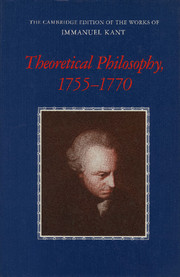Book contents
- Frontmatter
- Contents
- General editors' preface
- Preface
- Guide to abbreviations
- General introduction
- Introductions to the translations
- Résumés of the works
- A NEW ELUCIDATION OF THE FIRST PRINCIPLES OF METAPHYSICAL COGNITION (1755)
- THE EMPLOYMENT IN NATURAL PHILOSOPHY OF METAPHYSICS COMBINED WITH GEOMETRY, OF WHICH SAMPLE I CONTAINS THE PHYSICAL MONADOLOGY (1756)
- AN ATTEMPT AT SOME REFLECTIONS ON OPTIMISM (1759)
- THE FALSE SUBTLETY OF THE FOUR SYLLOGISTIC FIGURES (1762)
- §1 General concept of the nature of syllogisms
- §2 Concerning the supreme rules governing all syllogisms
- §3 Concerning pure and mixed syllogisms
- §4 In the so-called first figure only pure syllogisms are possible. In the remaining three figures nothing but mixed syllogisms is possible
- §5 The logical division of the four syllogistic figures is a piece of false subtlety
- §6 Concluding reflection
- THE ONLY POSSIBLE ARGUMENT IN SUPPORT OF A DEMONSTRATION OF THE EXISTENCE OF GOD (1763)
- ATTEMPT TO INTRODUCE THE CONCEPT OF NEGATIVE MAGNITUDES INTO PHILOSOPHY (1763)
- INQUIRY CONCERNING THE DISTINCTNESS OF THE PRINCIPLES OF NATURAL THEOLOGY AND MORALITY (1764)
- M. IMMANUEL KANT'S ANNOUNCEMENT OF THE PROGRAMME OF HIS LECTURES FOR THE WINTER SEMESTER 1765 — 1766 (1765)
- DREAMS OF A SPIRIT-SEER ELUCIDATED BY DREAMS OF METAPHYSICS (1766)
- CONCERNING THE ULTIMATE GROUND OF THE DIFFERENTIATION OF DIRECTIONS IN SPACE (1768)
- ON THE FORM AND PRINCIPLES OF THE SENSIBLE AND THE INTELLIGIBLE WORLD [INAUGURAL DISSERTATION] (1770)
- Factual notes
- Bibliographies of editions and translations
- Glossary
- Biographical-bibliographical sketches of persons mentioned by Kant
- Index
§2 - Concerning the supreme rules governing all syllogisms
Published online by Cambridge University Press: 18 December 2014
- Frontmatter
- Contents
- General editors' preface
- Preface
- Guide to abbreviations
- General introduction
- Introductions to the translations
- Résumés of the works
- A NEW ELUCIDATION OF THE FIRST PRINCIPLES OF METAPHYSICAL COGNITION (1755)
- THE EMPLOYMENT IN NATURAL PHILOSOPHY OF METAPHYSICS COMBINED WITH GEOMETRY, OF WHICH SAMPLE I CONTAINS THE PHYSICAL MONADOLOGY (1756)
- AN ATTEMPT AT SOME REFLECTIONS ON OPTIMISM (1759)
- THE FALSE SUBTLETY OF THE FOUR SYLLOGISTIC FIGURES (1762)
- §1 General concept of the nature of syllogisms
- §2 Concerning the supreme rules governing all syllogisms
- §3 Concerning pure and mixed syllogisms
- §4 In the so-called first figure only pure syllogisms are possible. In the remaining three figures nothing but mixed syllogisms is possible
- §5 The logical division of the four syllogistic figures is a piece of false subtlety
- §6 Concluding reflection
- THE ONLY POSSIBLE ARGUMENT IN SUPPORT OF A DEMONSTRATION OF THE EXISTENCE OF GOD (1763)
- ATTEMPT TO INTRODUCE THE CONCEPT OF NEGATIVE MAGNITUDES INTO PHILOSOPHY (1763)
- INQUIRY CONCERNING THE DISTINCTNESS OF THE PRINCIPLES OF NATURAL THEOLOGY AND MORALITY (1764)
- M. IMMANUEL KANT'S ANNOUNCEMENT OF THE PROGRAMME OF HIS LECTURES FOR THE WINTER SEMESTER 1765 — 1766 (1765)
- DREAMS OF A SPIRIT-SEER ELUCIDATED BY DREAMS OF METAPHYSICS (1766)
- CONCERNING THE ULTIMATE GROUND OF THE DIFFERENTIATION OF DIRECTIONS IN SPACE (1768)
- ON THE FORM AND PRINCIPLES OF THE SENSIBLE AND THE INTELLIGIBLE WORLD [INAUGURAL DISSERTATION] (1770)
- Factual notes
- Bibliographies of editions and translations
- Glossary
- Biographical-bibliographical sketches of persons mentioned by Kant
- Index
Summary
The considerations which have been adduced show that the first general rule of all affirmative syllogisms is this: A characteristic mark of a characteristic mark is a characteristic mark of the thing itself (nota notae est etiam nota rei ipsius). And the first general rule of all negative syllogisms is this: that which contradicts the characteristic mark of a thing, contradicts the thing itself (repugnans notae repugnat rei ipsi). Neither of these rules is capable of further proof. For a proof is only possible by means of one or more syllogisms, so that attempting to prove the supreme formula of all syllogisms would involve arguing in a circle. That these rules, however, contain the universal and ultimate ground of every kind of syllogism is apparent from the following fact: the principles which all logicians have hitherto regarded as the first rules of all syllogisms have to borrow the only ground of their truth from our two rules. The dictum de omni, the ultimate ground of all affirmative syllogisms, runs thus: that which is universally affirmed of a concept, is also affirmed of everything subsumed under that concept. The proof of this principle is clear. A concept, under which other concepts are subsumed, is always abstracted, as a characteristic mark, from those subordinate concepts. Now, that which belongs to this concept is a characteristic mark of a characteristic mark, and thus it is also a characteristic mark of the things themselves from which it has been abstracted. That is to say, that which belongs to the concept belongs to the lower concepts which are subsumed under it. Anybody with even a moderate knowledge of logic can easily see that the dictum de omni is true simply for this reason, and that it therefore is governed by our first rule. The dictum de nullo stands in exactly the same relation to our second rule. That which is universally denied of a concept is also denied of all that which is subsumed beneath that concept.
- Type
- Chapter
- Information
- Theoretical Philosophy, 1755–1770 , pp. 91Publisher: Cambridge University PressPrint publication year: 1992



